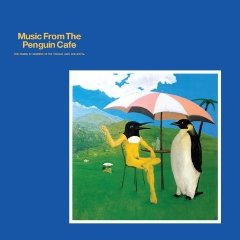*Music From The Penguin Cafe
*Penguin Cafe Orchestra
*Broadcasting From Home
*Signs Of Life
*When In Rome…
*Union Cafe
Penguin Cafe Orchestra, a large, shifting coalition of classical and acoustic musicians led by the late Simon Jeffes, are often regarded with either confusion or contempt. They’re occasionally tossed carelessly into the “new age” file, or taken to be purveyors of whimsical instrumental ditties, with works like ‘Telephone And Rubberband’ (you know, the one with the looped dialling tone) often used in advertising campaigns. As a declared renegade from the avant garde, Jeffes might be taken as a sellout, but while Penguin Cafe are the easiest of “difficult” music, they defy comparison – they are sui generis.
The idea of the Penguin Cafe came to Jeffes in a dream he had following a bout of food poisoning in 1972. It would become a sort of creative zone in which all the subconscious instincts we suppress so as to maintain order in our daily lives were allowed free and easy play. This could be a formula for chaos but, for all its unexpectedness, its juxtapositions of high classical and rustic folk, Penguin Cafe music is warm, tonal, accessible, generally brings a smile to the face in its playful and unlikely resolutions of opposites. Its benign simplicity also belies the quite astonishing lateral leaps of thinking it takes. Random example; ‘The Snake And The Lotus’ from ‘Signs Of Life’, whose main riff ascends unassumingly up and down the fretboard as if it were a flight of stairs. Yet for all its modesty, it’s one of the treasures of the PCO canon. From what depths of his pysche did Jeffes pull this tiny pearl?
Music From The Penguin Cafe, their first album, appeared in 1976 and, while to an extent in the thrall to Eno’s Ambient series, probably has more in common with the French group ZNR, who were engaged in a similarly eclectic, faux chamber music at the time. It’s with their second, self-titled album in 1981 that they establish the principles which inform the remainder of their work, with the Ravel-like hoedown of ‘Air A Danser’ a prime example. Ukuleles, harmoniums and accordions glide weightlessly across an imaginary dancefloor arm in arm with elegant, wafting string sections, both challenging and befriending the listener.
African elements flavour the gumbo, as on the woodblocks and chimes of ‘More Milk’, while ‘Music By Numbers’ even offers fleeting reminders of ‘Pump Up The Volume’. A dapper strain of melancholy occasionally courses through PCO, as on ‘Southern Jukebox Music’ which is surprisingly funereal, although John Cage would have approved of ‘Cage Dead’ from 1993’s Union Cafe, whose melody progresses according to the letters of the title. In the main, however, this is Utopian music, a celebration of the imaginary equality of all things, never more dreamily expressed than on ‘Wildlife’, the humid, luxuriant sprawl that concludes Signs Of Life.


